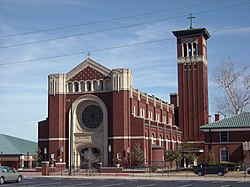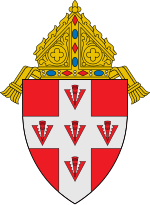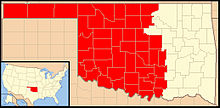Roman Catholic Archdiocese of Oklahoma City
Latin Catholic ecclesiastical jurisdiction in Oklahoma, USA From Wikipedia, the free encyclopedia
The Archdiocese of Oklahoma City (Latin: Archidioecesis Oclahomensis) is a Latin Church ecclesiastical territory or archdiocese of the Catholic Church of western Oklahoma in the United States. The mother church of the archdiocese is the Cathedral of Our Lady of Perpetual Help in Oklahoma City.
Archdiocese of Oklahoma City Archidioecesis Oclahomensis | |
|---|---|
 The Cathedral of Our Lady of Perpetual Help | |
 Coat of Arms of the Archdiocese of Oklahoma City | |
| Location | |
| Country | United States |
| Ecclesiastical province | Archdiocese of Oklahoma City |
| Statistics | |
| Area | 42,470 sq mi (110,000 km2) |
| Population - Total - Catholics | (as of 2021) 2,231,272 178,502 ( 8%) |
| Information | |
| Denomination | Catholic |
| Sui iuris church | Latin Church |
| Rite | Roman Rite |
| Established | August 23, 1905 |
| Cathedral | Cathedral of Our Lady of Perpetual Help |
| Current leadership | |
| Pope | Francis |
| Archbishop | Paul Stagg Coakley |
| Bishops emeritus | Eusebius Joseph Beltran |
| Map | |
 | |
| Website | |
| archokc.org | |
As of 2024, His Excellency, The Most Reverend, Paul Coakley is archbishop of Oklahoma City. As such, he is the metropolitan bishop of the ecclesiastical province which includes the Archdiocese of Oklahoma City, the Diocese of Tulsa and the Diocese of Little Rock.
History
Summarize
Perspective
1830 to 1875
The first Catholic presence in Oklahoma, then known officially as the Indian Territory, was in 1830. Charles Van Quickenborne, a Jesuit priest, traveled from St. Louis, Missouri, to minister to Osage Nation people in the Cabin Creek area.[1] By this time, the Indian Territory was under the official Catholic jurisdiction of the Diocese of Little Rock. Over the next several decades, missionary priests from Arkansas would make periodic trips into the territory to visit the Native American peoples.
The first Catholic church in the Indian Territory was established in Atoka in 1872 for the Irish Catholic railroad workers in the area. Isidore Robot and Dominic Lambert, Benedictine monks from France, arrived in Atoka in 1875.[1] In 1876, Pope Pius IX erected the Apostolic Prefecture of Indian Territory, removing the Indian Territory from the Diocese of Little Rock. The pope named Robot as the first prefect of the territory.[2]
1875 to 1905
Robot purchased land in 1875 from the Potawatomi Nation to build a monastery for members of the Benedictine order along with a school and church for the Potawatomi. This facility became known as Sacred Heart Mission and Abbey. In 1880, he opened a girls school, staffed by several nuns from New Orleans. In 1884, Robot opened Our Lady of Good Counsel Parish at Lehigh, the second Catholic church in Indian Territory. Robot resigned as prefect in 1887.[2] The Vatican replaced Robot with the Benedictine Ignatius Jean. In 1889, Jean invited the Benedictine Sisters from Iowa to open a monastery in present-day Guthrie.[3]
In 1891, recognizing the increasing population of the Indian Territory, Pope Leo XIII elevated the Apostolic Prefecture of Indian Territory to the Apostolic Vicariate of Indian Territory. The pope named Theophile Meerschaert from the Diocese of Natchez as the apostolic vicar.[4] At the time of Meerschaert's arrival, the new vicariate had three diocesan priests, 23 Benedictine monks, 21 churches, seven day schools, five Native American boarding schools, one college, one monastery, six convents and a Catholic population of approximately 5,000. The first Catholic church in Oklahoma City, St. Joseph's, was completed in 1889.[5]
1905 to 1972
In 1905, Pope Pius X erected the Diocese of Oklahoma, suppressing the apostolic vicariate. The pope named Meerschaert as its first bishop of the new diocese. St. Joseph's Church was designated as its cathedral.[5] The Indian Territory became the State of Oklahoma in 1907. Meerschaert dedicated about 100 new churches and recruited over 12 American-born clergy during his tenures as vicar and bishop.[6] By the time of his death in 1924, the Catholic population had increased elevenfold.[6]
The second bishop of Oklahoma was Francis Kelley, a Vatican diplomat named bishop by Pope Pius XI in 1924. During his years as bishop, he successfully resisted the agitation of the Ku Klux Klan in the diocese and continued his work as the "Extension Bishop."[7] In 1930, Pius XI renamed the Diocese of Oklahoma as the Diocese of Oklahoma City-Tulsa, reflected population trends in Oklahoma. Kelley remained as bishop.[4] In 1931, Our Lady of Perpetual Help Church in Oklahoma City became the new cathedral for the diocese.[7] Bishop Eugene J. McGuinness from the Diocese of Raleigh was appointed coadjutor bishop of Oklahoma City-Tulsa in 1944 by Pope Pius XII to assist Kelley.[8] When Kelley died in 1948, McGuiness automatically succeeded him as bishop.
In 1949, McGuiness established the National Shrine of the Infant Jesus of Prague at St. Wenceslaus Parish in Prague, Oklahoma.[9] During his nine-year administration, McGuinness saw the Catholic population in the state grow by almost 40 percent and received 1,242 adult converts in 1957 alone.[10] Priestly and religious vocations increased and he made trips to Ireland and Poland to recruit clergy.[10]
In December 1957, Pius XII selected Victor Reed as an auxiliary bishop in Oklahoma City-Tulsa. However, McGuinness died before Reed was consecrated. The pope named Reed in January 1958 to serve instead as bishop of the diocese.[11] After the Second Vatican Council between 1962 and 1965, he introduced the use of vernacular in the mass and an emphasis on pastoral over administrative skills in bishops.[12] In 1966, a group picketed his residence and called for his removal. They accused Reed of following "un-Catholic" policies and participating in a "worldwide atheistic conspiracy for world domination" led by communists.[13] Reed died in 1971. Pope Paul VI replaced Reed with Auxiliary Bishop John R. Quinn from the Diocese of San Diego in 1971.[14]
1972 to 1992
On December 13, 1972, Pope Paul VI elevated the Diocese of Oklahoma City-Tulsa to the Archdiocese of Oklahoma City. At the same time, he erected the Diocese of Tulsa, consisting of eastern Oklahoma. The new archdiocese now contained the counties of central and western Oklahoma. The Dioceses of Little Rock and Tulsa became suffragan dioceses of the archdiocese.[15] Quinn became the first archbishop of Oklahoma City. Quinn became archbishop of San Francisco in 1977.
The second archbishop of Oklahoma City was Bishop Charles Salatka from the Diocese of Marquette, appointed by Paul VI in 1977.[16] He founded the Office of Hispanic Ministry in the 1970s and learned to speak Spanish at age 68 so that he could celebrate mass in that language. In October 1981, Salatka celebrated a funeral mass in Oklahoma City for Stanley Rother, a priest from the diocese. Rother was murdered by three assassins in July 1981 while on a mission in Guatemala. Salatka had recalled Rother to Oklahoma in January 1981 due to threats on his life. However, Rother persuaded him to allow his return to Guatemala.[17] Salatka retired in 1992.
1992 to present
Pope John Paul II named Bishop Eusebius J. Beltran of Tulsa as archbishop of Oklahoma City in 1992.[18] Beltran became the official publisher of the Sooner Catholic, a bimonthly newspaper for Catholics in Oklahoma. Beltran's sermons were featured in each number of the newspaper during his tenure. Beltran retired in 2009.
Bishop Paul Coakley of the Diocese of Salina became the next archbishop of Oklahoma City, named by Pope Benedict XVI in 2010.[19] In 2014, Coakley sued a Satanist group in Oklahoma City, saying that they had stolen consecrated host from a church to use in a so-called black mass ceremony at the Civic Center Music Hall in Oklahoma City. However, when the host was returned to the archdiocese a few days later, Coakley dropped the lawsuit.[20] In 2017, Rother was beatified during a mass at the Cox Convention Center in Oklahoma City. Pope Francis had declared him a martyr, saying he had been killed in odium fidei (in hatred of the faith).[21]
As of 2023, Coakley is the archbishop of the Archdiocese of Oklahoma City.
Sex abuse
In 1999, James Rapp, a priest of the Archdiocese of Oklahoma City, pleaded no contest to sexually abusing two boys during the 1990s in Duncan, Oklahoma. He was sentenced to 40 years in state prison.[22] Rapp had previously been accused of sexually abusing children at a Catholic junior high school in Jackson, Michigan, in the 1980s. After those accusations, Rapp's religious order sent him away for eight months of psychiatric treatment. When Rapp finished treatment, Archbishop Salatka approved his transfer to the archdiocese. In 2003, the archdiocese settled a sexual abuse lawsuit filed by a Rapp victim in 1999. The plaintiff, Casey Johnson, said that Rapp sexually molested him three times as a minor.[22]
In 2018, the archdiocese announced that a laicized priest, Ben Zoeller, had been performing volunteer work at Sacred Heart Parish in Oklahoma City. After making the discovery, Archbishop Coakley banned him from volunteering anywhere in the archdiocese. Zoeller had been accused of sexual abuse in the 1980s, removed from ministry in 2002 and defrocked in 2011.[23]
The archdiocese in October 2019 released an investigative report by an outside law firm on allegations of sexual abuse of minors by archdiocesan clergy. The report named 11 priests with credible accusations of sexual abuse.[24]
In May 2022, the archdiocese and Mount Saint Mary High School in Oklahoma City were sued for $75 million by ten females who were students or alumni of the school. The plaintiffs said that the archdiocese and Mount Saint Mary “fostered and allowed a rape culture” and “tolerated sexual harassment and assault” by male staff members and students.[25]
Bishops
Apostolic Prefects of Indian Territory
- Isidore Robot (1876–1887)
- Ignatius Jean (1887–1890)
Apostolic Vicar of Indian Territory
Theophile Meerschaert (1891–1905), appointed Bishop of Oklahoma
Bishops of Oklahoma
- Theophile Meerschaert (1905–1924)
- Francis Kelley (1924–1930), title changed with title of diocese
Bishops of Oklahoma City-Tulsa
- Francis Kelley (1930–1948)
- Eugene J. McGuinness (1948–1957; coadjutor bishop 1944–1948)
- Victor Reed (1958–1971)
- John R. Quinn (1971–1972), elevated to archbishop and title changed with title of diocese
Archbishops of Oklahoma City
- John R. Quinn (1972–1977), appointed Archbishop of San Francisco
- Charles Salatka (1977–1992)
- Eusebius J. Beltran (1993–2010)
- Paul Stagg Coakley (2011–present)
Other priests of this diocese who became bishops
- Stephen Aloysius Leven, appointed auxiliary bishop of San Antonio in 1955
- Charles Albert Buswell, appointed Bishop of Pueblo in 1959
- John Joseph Sullivan, appointed Bishop of Grand Island in 1972
- Anthony Basil Taylor, appointed Bishop of Little Rock in 2008
- Edward Joseph Weisenburger, appointed Bishop of Salina in 2012
Newspaper
The official news and information publication of the diocese is the Sooner Catholic.
High schools
- Bishop McGuinness High School – Oklahoma City
- Cristo Rey Catholic High School – Oklahoma City
- Mount St. Mary High School – Oklahoma City
Closed university
St. Gregory's University – Shawnee (closed 2017)
Summer camps
Our Lady of Guadalupe Summer Camp – in between Luther and Wellston
Ecclesiastical province

See also
- Catholic Church by country
- Catholic Church in the United States
- Ecclesiastical Province of Oklahoma City
- Global organisation of the Catholic Church
- List of Roman Catholic archdioceses (by country and continent)
- List of Roman Catholic dioceses (alphabetical) (including archdioceses)
- List of Roman Catholic dioceses (structured view) (including archdioceses)
- List of the Catholic dioceses of the United States
Sources
External links
Wikiwand - on
Seamless Wikipedia browsing. On steroids.
